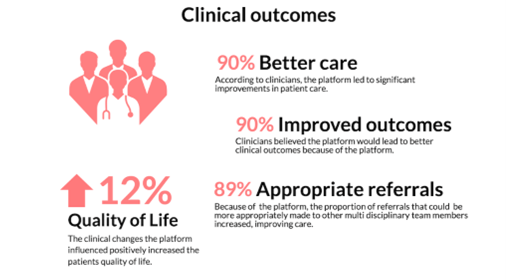Insight
Parkinson’s and Dementia cost the UK £30 billion annually (1,2) Long waits for clinical decisions can lead to poor quality of life and increased healthcare costs (3,4).
The undermanagement of neurology conditions presents our health and care system a growing problem.
- Expanding waiting list: The number of people waiting for clinic appointments is growing, delaying care (5).
- Subjective data: Clinical decisions are often based on subjective and incomplete information, leading to less effective care.
- Sparse care: 6-12 months between appointments, leads to delays when treatments are reviewed and adjusted.
- Poor outcomes for patients: Delays in care and undermanagement leads to lower quality of life, deterioration and increased costs of unplanned care and admissions.
Facilitated by Health Innovation East, East Suffolk and North Essex Foundation Trust (ESNEFT) has adopted Neu Health’s Digital Platform to revolutionise care for people with Parkinson’s Disease.
Intervention
Neu Health is a spinout from the University of Oxford that builds on 10 years of research and clinical validation. It’s innovative approach integrates a user-friendly smartphone app and a clinician dashboard with advanced machine learning analytics to empower patients and optimise clinical services. Alongside significant clinician and patient reported benefits Neu Health also delivers 20% efficiency savings, which enables more effective care delivery for the NHS.
The Neu Health solution for Parkinson’s patients includes a prescribed app that utilises smartphone sensors to objectively measure clinical symptoms remotely. Symptoms measured include voice, balance, walking, finger dexterity, reaction time, tremor, and cognition. Non-motor symptoms including sleep and medication adherence are also collected. The data becomes immediately available to the patient’s clinical team via an online dashboard, which provides a comprehensive longitudinal view of a patient’s condition outside the clinic environment.
Neu Health supports the government’s goal to move treatment away from hospitals and into the community as well as transitioning from analogue to digital.
The platform is being used in six acute hospitals and has just started to be used with dementia patients in mental health trusts.
Support from Health Innovation East to accelerate the spread and adoption of Neu Health has included:
-
- Introduction to Suffolk and North East Essex ICB and involvement in an ICB innovation panel.
- Co-funding for and independent economic analysis.
- Service evaluation support.
- Support to extend the programme from Ipswich Hospital to Colchester and on to West Suffolk Hospital.
- Championing the innovation at key regional and national events including Health Innovation East’s 2024 Autumn Innovation Showcase.
- Independent service evaluation analysis and report
Impact
Adopting Neu Health at ESNEFT has seen clinicians report significant improvements in care and clinical outcomes for 90% of patients. 53% of patients experienced changes in their care, including optimised medication and more appropriate treatment regimens.
There are now 750+ Parkinson’s patients benefiting from the platform. An independent economic analysis, conducted by CorEvitas in 2024, has identified that Neu Health delivers a net saving of £2,000 per patient per year, and established a possible patient cohort of 113,000 annually, nationwide. The following potential benefits include:
- 70,000 saving – outpatient face to face appointments
- 44,000 reduction in A&E attendances
- 35,000 reduction in non-elective inpatient admissions
- 34,000 reduction in neurology hours

There are now 750 patients benefiting from the platform. In November 2024, Neu Health launched the Dementia focused iteration of its innovative product.
Get in touch
If you would like to find out more about Neu Health, please get in touch by emailing enquiries@healthinnovationeast.co.uk
References:
1 – Alzheimer’s Research UK. (2024). The Economic Impact of Dementia. [Online]. www.dementiastatistics.org. Last Updated: 2024. Available at: https://dementiastatistics.org/statistics/the-economic-impact-of-dementia/#:~:text=Dementia%20is%20a [Accessed 20 December 2024].
2– Cure Parkinson’s. (2023). UK sleepwalking into Parkinson’s pandemic. [Online]. www.cureparkinsons.org. Available at: https://cureparkinsons.org.uk/2023/08/uk-sleepwalking-into-parkinsons-pandemic/ [Accessed 20 December 2024].
3– Tinelli, M. Kanavos, P. Grimaccia, F. (2016). The Value of Early Diagnosis and Treatment in Parkinson’s Disease. [Online]. www.lse.ac.uk. Last Updated: November, 2016. Available at: https://www.lse.ac.uk/business/consulting/assets/documents/the-value-of-early-diagnosis-and-treatmen [Accessed 20 December 2024].
4– National Collaborating Centre for Mental Health. (2018). The Dementia Care Pathway: Full implementation guidance. [Online]. www.rcpsych.ac.uk. Last Updated: October, 2018. Available at: https://www.rcpsych.ac.uk/docs/default-source/improving-care/nccmh/dementia/nccmh-dementia-care-path [Accessed 20 December 2024].
5- The King’s Fund. (2024). Waiting Times for Elective (non-urgent) Treatment: referral to treatment (RTT). [Online]. www.kingsfund.org.uk. Available at: https://www.kingsfund.org.uk/insight-and-analysis/data-and-charts/waiting-times-non-urgent-treatment [Accessed 20 December 2024].